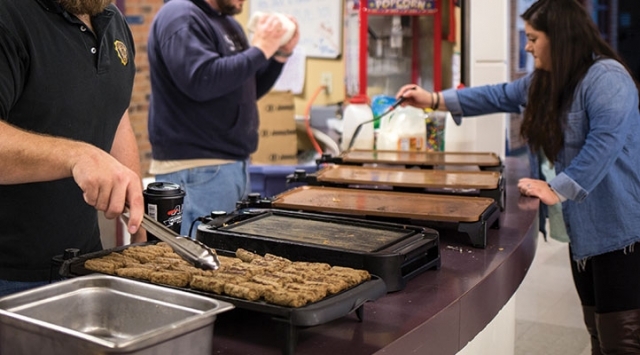
American Legion posts nationwide re-engage with the community to boost membership numbers and support.
Membership is the heart of The American Legion. And as the organization prepares to celebrate its 100th birthday, posts strive to increase membership to lead The American Legion into its second century of service. Many are doing so by reinventing themselves to stay relevant in their communities and to draw in new, active members.
Membership at Ray Dozier Post 8 in Crawfordville, Ga., had dwindled to two members. Instead of turning in its nearly 100-year-old charter, the post adjutant and commander revitalized the post by “recommitting to the community that they loved. And the community responded,” said Georgia’s 11th District Junior Vice Commander Michael Gallucci, who recently visited the post to present a 100 percent membership banner for the second consecutive year. “If membership is the lifeblood of The American Legion, then I would suggest that community is the oxygen to that lifeblood.”
Post 8 achieved 108 percent membership for 2017-2018. Membership grew through the hosting of community cookouts, breakfasts and open houses, and by visiting schools and businesses. “They inculcated their community and reinvigorated the brotherhood of veterans to the purpose of why they had become an American Legion post,” Gallucci said. “As we search for the reasons why we, as an organization, continue to not attract new members and retain members, perhaps we need to understand how these small communities keep their posts. Post 8 is a snapshot of so many small posts that dot this nation. Faced with an aging membership and the need to engage the younger generation of veterans and their families required re-evaluation.”
Matheny & Henderson American Legion Post 131 in Leslie, Ark., had dropped to single digits in membership about 11 years ago. Post 131 Chaplain Steve Stephenson had an idea to reach out to local youth and show the community that the post could make a positive impact on those around it.
Stephenson accomplished both, and in doing so also boosted the post’s membership.
Post 131’s Veterans in the Schools Program has helped grow post membership to more than 100.
The program connects veterans with students in the Searcy County School District, which consists of four schools. It involves an essay and poster contest, certificates and cash prizes – roughly $600 per year – are given out to creators of the top posters and essays grouped by grades: grades 1-3, grades 4-6, grades 7-9, grades 10-12 and a composite from the alternative education center. Recent essay contest subjects have included “Veterans In My School,” “What I Will Do To Help My Neighbors” and “What Does Personal Responsibility Mean.”
The topics are shared with the schools via visits to every classroom from post members. There are more than 100 essays submitted annually to the post, which chooses winners in each category.
Besides membership growth, the post also moved from an old log hut that the original World War I members of Post 131 had built to a new, 9,000-square-foot log building that includes a large hall and kitchen. The new post home features a wall covered with almost 800 pictures of veterans from the community.
Stephenson said the relationship with the school district has been “very successful. We’ve gone way up in our membership. And we are a presence in the community.”
Carroll Post 31 in Westminster, Md., recently held a veterans benefits fair and open house that included staff from the Department of Veterans Affairs and Veterans Services Bureau, and Legion service officers. About 130 area veterans attended the event to receive assistance with VA benefits. And the post signed up seven new members.
“In the preamble we recite, ‘To inculcate a sense of individual obligation to the community, state and nation,’” Gallucci said. “Always interested in building a better nation, the founders of The American Legion believed that such building must start first with the individual in his or her own community.”
- Dispatch

